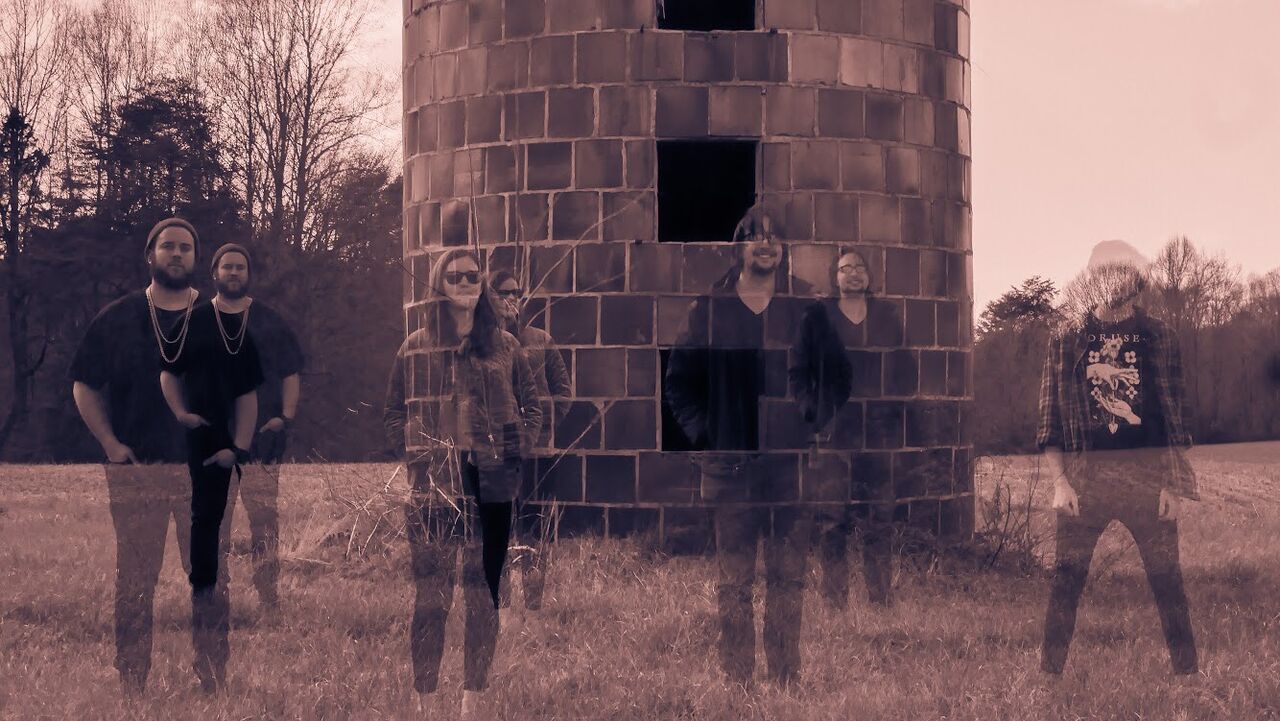

When Casper Skulls vocalist/guitarist Melanie St-Pierre was eight years old, she witnessed a murder. Playing outdoors with childhood pals, a neighbor shot her best friend’s father seemingly unprompted. St-Pierre testified at the trial, then buried the memory deep. On her band’s latest record, Knows No Kindness (released November 12 via Next Door Records), she excavates this and other moments – some bitter, some sweet – with a poet’s precision, unearthing truths about the human condition in the process.
“Witness,” for instance – the song that deals with the murder – doesn’t recount the grisly details of what she saw that day. Rather, it reframes the trauma as moment in time where a young girl fought for and found justice, resonating with strength while, understandably, honoring the innocence that was lost. “When I was young/I never knew what death was/Or that I could live next to it,” St-Pierre sings in the last verse. “Loving someone and then they’re gone/What have you done?” It’s a powerful statement about believing children, and young girls especially, and how traumatic events can reverberate through our lives to emerge in unexpected ways.
Released November 12, Knows No Kindness takes its title from Georgia O’Keefe’s description of the desert’s formidable beauty, but also the process with which she rendered overlooked objects in exacting detail. St-Pierre does the same with fleeting and forgotten echoes in her life’s history, turning them over and over until her songs, like O’Keefe’s paintings, take their larger-than-life shapes. And the rest of Casper Skulls – guitarist Neil Bednis, drummer Aurora Bangarth, and bassist Fraser McClean – help bring out each detail with compositions just as painstakingly rendered, recorded across four different Toronto-area studios.
“We worked with so many different engineers on this record… We knew what we wanted for it. We self-produced it, but the engineers that we worked with really helped us get it to where it needed to be and it was a little bit meticulous,” says St-Pierre. “We worked very hard on this record. Down to the arrangements and everything – we all had helping hands, we all made contributions. It was really nice to work with some local people in Toronto that helped us, that understood our vision, and understood what we were going for and understood the songs.”
That’s vastly different from how they approached debut LP Mercy Works, whose lead single “Lingua Franca” was nomimated for a SOCAN Songwriting Prize in 2018. A noisier affair that earned them supporting slots for Thurston Moore, Julie Ruin, PUP, Hop Along, Speedy Ortiz, and Charly Bliss among others, the attention may have “spooked” St-Pierre just a bit, she says, though she notes that her bandmates help keep her grounded. Almost immediately after the release of Mercy Works, the songs that would form Knows No Kindness began to pour out.
“Actually, we’ve been trying to get to this record for a while. We started off being a bit of a louder band in the beginning – [Neil and I] were just kind of fooling around in a basement with some pals and ‘King of Gold‘ happened, and it’s just like, [your first song] ends up being the trajectory of your band,” St-Pierre says of the decidedly post-punk inflected track, on which Bednis takes lead vocal. “That’s what was coming out at the time. But that was such a long time ago. That was six years ago! And just as you grow and change, you get better at writing, you get more mature. And I think for me anyways, this is the record where I really do feel like I have improved so much with songwriting and this is the statement of that, I guess. I’m a musician, I really feel it, it feels nice.”
“This album is almost like a fresh start in a way,” says Bangarth, who joined the band as Knows No Kindness was taking shape, bringing both classical training and years of studio drumming to provide the band’s heartbeat. “There’s still a lot of sonic similarities – Neil’s guitar tone is a defining characteristic of the band. It’s still there. But it does kind of feel almost like a fresh start in a way because there’s such a different take on things.”
“I feel like we never do songwriting the same way each time. We change our sound a lot… and that’s great cause it’s a growing process, you’re learning how to write, you’re learning how to put away things that don’t serve you anymore, and you’re picking up new things,” St-Pierre confirms. “This new record was just what was serving me at the time aesthetically. I was homesick a lot, thinking a lot about Massey, which was a town that my grandma grew up in; I spent a lot of time there as a child. And [my hometown] Sudbury as well. Those are just the things that organically came out. I think it made things a little bit more melancholy but in a really nice sort of way that we could still keep it very much Casper Skulls.”
“Tommy” was the song that kickstarted things, and it opens the album with resonant piano notes. St-Pierre and Bednis had noticed that a friendly man in their neighborhood was leaving items behind in the bus shelter for others to take. “They were things that were really useful, like bike helmets or jams, CDs, things to make people happy, and they would be gone by the end of the day,” St-Pierre recalls. She began to wonder about his interior life, about the unknowable realities of everyone we encounter. “I’ll never understand that part of me that is tied to you,” she sings as the band builds up a lush sonic palette.
“The second verse on ‘Tommy’ is my favorite thing on the whole album,” Bangarth says. “Just all of those layers and pieces together… I just really love it. It’s dense but everything has its place and I’m just really proud of how that turned out.”
Like her mysterious neighbor leaving useful items behind for others, St-Pierre leaves breadcrumbs across Knows No Kindness for listeners to follow. “Honestly it really did create these helping hands to like hold up my childhood and examine these things, and it started with ‘Tommy,'” she says. On “Thesis,” she pays tribute to an English teacher who encouraged her scattered prose – and kept St-Pierre writing. But it also acts as a blueprint for the rest of the record. “The first few lines of it literally talk about ‘Witness,’ the next few lines talk about ‘Knows No Kindness,’ the next few lines talk about ‘Stay the Same’ – it’s all in there,” St-Pierre points out. “The last lines are about me being who I am. I love winter; I think that it has something really beautiful in it and for me. It reminds me of my femininity, it’s what makes me feel good and creative.”
While St-Pierre cites “Ouija” as the best song she’s ever written, Bangarth points to “Rose of Jericho” as a personal favorite. It’s named for a type of tumbleweed that goes dormant and appears dead, but dramatically revives when in contact with water. “The way that song grows, it starts off completely different but it feels natural. I think that song is a good representation of where we are now, and remember, this is where we were.”
The personal touches extend to the album’s artwork too, which St-Pierre designed (she’s also a visual artist who has directed the bulk of the band’s visual aesthetic). The 1960 photograph depicts Massey, Ontario townsfolk (including St-Pierre’s grandmother, Velma) protesting the A.E.C.L in an attempt to stop the now-defunct nuclear waste company from creating a runoff where the Spanish and Sables Rivers meet, in an area known as The Mouth Park. They were successful in running the company out of town, and St-Pierre spent her childhood swimming in the park, referenced in an album track called, appropriately, “The Mouth,” which exhibits the quiet/loud dynamics that make Knows No Kindness such a revelation to listen to. “The Mouth” ranks among Mercy Works track “Colour of the Outside” as one of the band’s favorite to play live. “I love being able to do some loud things. I love to rock out. If we couldn’t do that live anymore, I’d be sad.” St-Pierre says. “I like being able to get really quiet and little and then get really loud. I think that there’s such a space for both.”
Though Casper Skulls had to take a break from touring amid the pandemic, they’d already been working out most of the songs on Knows No Kindness on stage. “It’s almost like the album was written in two phases,” explains Bangarth. “We got all the sounds written for being tour-ready first, and then just by touring them a ton, we got really comfortable on them. Then there was kind of this second process of arranging them for the album. By that point we’d already become super familiar with them, and had been tweaking them along the way anyway.” All but one of the recording sessions took place before lockdown in March of 2020; that last session got pushed back to July. Since then, they’ve been working on new stuff – and will likely go in a completely new direction once more.
“I don’t think one person has all the answers for songs – maybe some people do if they’re like, Bob Dylan. But I personally really love collaboration. I think it’s a really beautiful thing. It’s nice to bring people into the story, into the fold and just have these ideas bouncing around and these exciting moments. I live for that,” says St-Pierre. “I think our next record I just want to make some really nice striking songs and collaborations and let things kind of breathe a bit more, and just see how that works out.”
After making such a vulnerable record, St-Pierre definitely needs the emotional respite. Writing Knows No Kindness was, at times, “pretty unbearable,” she says. “We would jam and you would be able to tell I’d be kind of getting weird, crying, or something. But then eventually it started to be better. When you bring them to jam and start working on them, you start seeing these songs taking all these different shapes. It becomes this other thing and you can detach a little bit. Then when you start playing them live, you’re the one singing, it comes back again, but then when you do it over and over and over again for a tour, you’re like, okay I got this, I’m not gonna break.”
“But there are still moments,” she adds. “Say I’m playing live and it’s getting real emotional, we’re playing really well and I’m really feeling it, I’ll cry during a set. It’ll happen. And I’ll play it off a little, but you can hear the vulnerability in my voice or something, you can tell. People will come up to me after we play and be like, I don’t know what that song was about but it made me really reflect on something that happened to me. I’ve had a lot of those [comments], like this song made me think this, and thank you for that and that is a huge accomplishment. That’s why we do this.”
This is the very fiber of Knows No Kindness, and each song is constructed in service to building up those moments and memories. It’s the kind of album you can only write once, though; while there are glimmers of Casper Skulls’ noisy past, no song here feels interchangeable with any on their debut.
“I really enjoyed like honing in on all these things but they’re very much for this,” St-Pierre says. “There’s a time and a place for each record, I think, and this one is just, this is its time and place. I wouldn’t have put ‘Witness’ on Mercy Works and I might not put it on the next record. It exists in this universe that Knows No Kindness exists in.”
Follow Casper Skulls on Instagram for ongoing updates.




